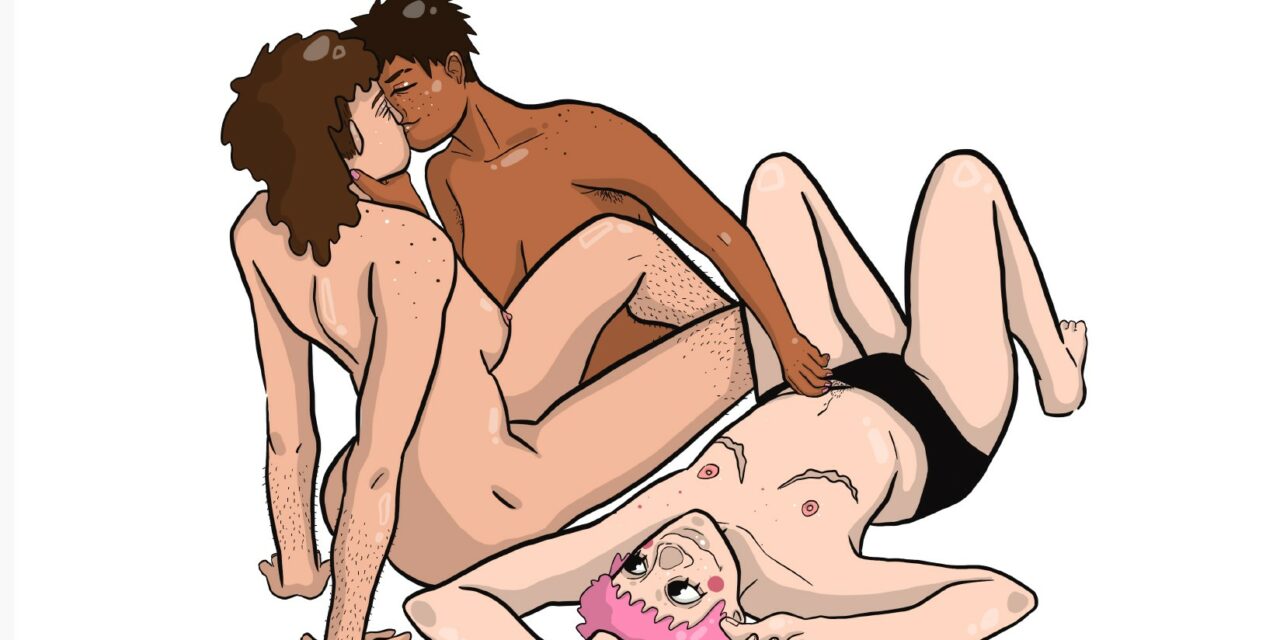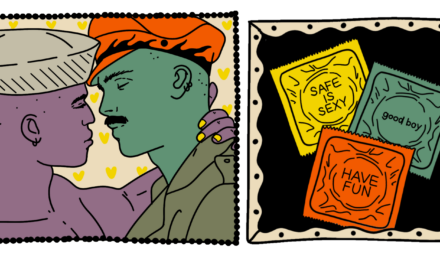Writing as someone who attends sex parties for field research, and enjoys being tied up through rope bondage as a means of embodiment practice.
I am painting you the picture of a non-prudish queer woman.
As a Berlin resident I live in a city that can be considered the mecca of sexual liberation. Partying at sex clubs is so casual you might well meet your dentist on the dance floor. A city where monogamy is a myth and latex can be worn in the daytime if you wish.
I learnt the hard way, on my very first visit to such a venue, that to be an empath at a sex club is to accept indirect violation. Juggling a drink in my hand and finding the right moves with my feet as I dance to the techno coming from the speakers while a woman on all fours is being fisted 2 meters away from me. My eyes twitched in a mix of surprise – the childlike gasp of a 4 year old that accidentally catches their parents making love on the couch – and actual visceral pain as I sensed this man’s fist pounding beyond my own uterus reaching my ribcage.
Curiosity to witness the full spectrum of human expression is what made me return to sex positive gatherings despite my quasi-traumatic experience years ago. I have found that sex parties are one of the rare occasions where one can experience true unbounded human expression in all its rawness. There is something honest in darkrooms that you rarely if ever get elsewhere in life. It’s a setting that allows for uninhibited free expression, where humans gather to claim their desires and allow for the mostly repressed animal within to find a platform to be seen. A true hallmark of non-judgment if you ask me.
Beyond the inclusive floors of sex clubs, where folk from all backgrounds, levels of openness, as well as gender and sex identities unite, a parallel sex positive landscape unfolds through the provocative lives of queer people.
Queers, in our own community bubble, often lead highly sexual and incredibly open lifestyles. By definition, the main factor that differentiates us from others relates to sexuality. And we make damn sure we are known for it through our pride marches that, aside from promoting the dignity, equality, and increased visibility of LGBTQIA+ people, is nowadays largely – let’s be honest – an occasion for shared, overtly debaucherous behavior. Our ancestors fought hard for our sex to be free and our love rejoiced so we take to the global streets to celebrate our version of liberation.
Pride and poppers seem to go hand in hand yet the fuckery goes beyond designated pride events. Looking at the lesbian side of things, link ups often end in cunnilingus glory, restroom finger fun, and awkward, while expected, run-ins with past lovers while they’re tongue deep in someone’s throat. On the grounds of hedonistic excess, queer raves are basically a modern day bacchanal for the bi and pan fraction of the community who may well divide their time between dance floor grooving, and feasting on an abundance of potentially pleasing fun.
Taking on digital dimensions, Grindr resembles Sodom and Gomorrah. The app is used mainly by homosexual men and trans people, and has revolutionized as well as simplified the dating process for a great slice of the queer community. In just a few minutes you create an online profile and within under an hour of scrolling you can find someone in the neighborhood who would want to fondle you and who is seriously willing to.
Although this all seems largely freeing and fun; from where I stand as a queer who works within the mental health space, when the glitter’s removed, the strap put to wash, and the wigs undone, the reality of queers’ inner state is too often alarming. My private vulnerable exchanges make me often wonder in all caps ‘’ARE WE GOING TO BE OK?!’’
Spending enough wild nights with friendly strangers and having heart-to-heart conversations with queer folk has exposed some truths I cannot unknow. Among them is promiscuity as escapism, which leads us to consider the implications of our lifestyle on our mental health.
Queer influence has undeniably been a strong driver for the era of sexual revolution which significantly shaped where we stand today. We’ve helped change the way that our society thinks about sex. Bringing kink to a state of normality and claiming freedom to cum as much as we want and with whomever we want as a birthright, has consequently impacted the liberty people outside of the community also enjoy. There is value our promiscuity has brought to the masses that is undeniable.
Simultaneously, numerous studies show that queer individuals are at greater risk for a number of mental health problems, including depression, anxiety, substance abuse, and suicidal behaviors. Largely due to identity development being a challenging process that often involves insecurity and self-image related mental health issues.
The messy path of self-discovery is also often accompanied by discrimination from a world that doesn’t seem to fully accept the diversity we bring to the table. LGBTQIA+ stigmas, hate crimes, and the fact that we are a minority that often goes through chaotic paths within our families in search of permission to be completely ourselves make us feel like we don’t belong which exacerbates our mental instability as it awakens a primitive fear of not belonging.
As a response to existing in such a tumultuous landscape it is expected that our inclination tends towards non-feeling, numbness and in turn resorting to some form of escapism as a coping mechanism. It’s far from our choice to experience certain aspects of the lives we have, so we find our ways to cope and live out our best attempt at thriving.
In some cases sex becomes a desperate attempt at affirming queer identity, which comes with its own shortcomings. While in others, when we are in a mode of escaping our reality, sex can be used as a means of self-alienation, a method to distance ourselves from feeling the uncomfortable weight of our existence. The act provides us with some relief, some instances of fleeting ease in the face of a turbulent headspace that weighs us down.
Avoiding certain internal processes however hinders our personal growth and impedes our rise to greater wellbeing. The issue is in using sex to avoid being present with internal realities that are quite painful. Using it to divert from the grief, anxiety, or sadness that are actually important to acknowledge. Repression and avoidance not only entrap you in a state of immaturity but also prevent you from experiencing lasting contentment. That is because the path to healing has more to do with careful exposure, reflecting on inner conflicts, facing hard truths, and increasing our tolerance of how we bear our burdens, rather than repression and avoidance, which only serve to either postpone or prolong suffering.
Casual sex is also a common cover up for the need for intimacy. We resort to quantity when we fear the implications of real quality. Depth in relationships after all, can be a scary prospect for those unfamiliar with consistency, reciprocity, and emotional security in interpersonal exchanges. It’s hastily accepting crumbs when there is a fresh loaf of bread straight out the oven you’re too scared to reach for in case you get burned. Then getting used to the crumbs, adjusting your appetite and next thing you know it’s been 3 years you’ve not had the sort of sex that shakes your ground, reaches your heart, and whispers ‘’I love you’’ after you cum. There’s a price to pay for keeping intimacy at arms length, one that might be preventing you from accessing full aliveness within.
When we zoom out to gauge the nature of common queer sexual exchanges we quickly come to see that behind careless fun, easy hookups, and a façade of sexual revolution is a crowd wanting to be seen and accepted, needing to heal, and loved as they are. Essentially a craving for intimacy without really knowing how to proceed and looking in unreliable ways, for something real.
Grindr although helpful for many gays to get it on is frankly akin to a grocery list. Dating apps in general commoditize the physicality of sex and have become this low-grade-validation-producing machine from which people feed their starved egos. What’s more is that chemsex parties are only good while you’re high and sex clubs might not be the right place to look for intimacy unless your personal definition is limited to getting off.
Part of the repercussions of promiscuity within the community is the resulting fickleness in queer connections. The ghosting, the unreliability, the exiting interactions the moment a minor inconvenience is detected, and forming hollow bonds that reach no depth nor serve for any significant fulfillment, as well as sex that too often doesn’t manage to extend beyond mediocrity.
The aftermath left is bodies that reach for sex with souls that ache for intimacy.
So moving forward what sort of queer landscape will we create? In every moment we’re given we lay the foundation for what we’ll become. The same way we’re only here today as a result of our ancestors’ intentions and actions, we’re given a certain amount of responsibility to respond to. If you just want to fuck, go off and get off. It’s worth asking yourself however whether you’re compensating for some inner lack, attempting to assert yourself within an identity, remaining surface level in fear of depth, or essentially escaping some internal process that urges you to attend to it.
Illustration: Lynn Kelders





